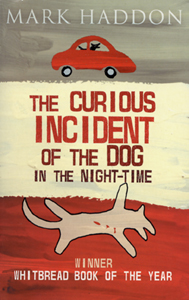Detective stories are a popular and well-established genre that rarely cross into the territory of capital "L' Literature. There are a few exceptions where the quality of the writing matches the interest of the story. Mark Haddon's award winner, The Curious Incident of the Dog in the Night-time is unusual in its literary merit. But this is not the only quality that distinguishes it from others in the genre " the victim in Haddon's tale is not a person but a large poodle who has been killed with a pitchfork.
Unlike most murder mysteries, the most interesting thing about this book is not the murder, the victim or the subsequent detective work but the narrative voice.
The story is told by 15-year-old Christopher Boone. After finding the dog at seven minutes past midnight one night Christopher decides to track down the killer. Encouraged by his teachers to keep a record of his progress and write it into a book, Christopher begins interviewing his neighbours to determine what happened to his neighbour's dog. Such an investigation may not seem too arduous but for Christopher it is an enormous challenge. He can hardly bear to speak with anyone especially strangers.

Christopher is autistic. He knows all the countries of the world and their capital cities. He knows every prime number up to 7507. But he cannot bear to be touched by anyone and if he sees four yellow cars in a row he knows it is going to be a Black Day.
Despite having a mind governed by rules, facts and logic his attitudes and behaviour are not always rational. He may value the truth and be unable to lie, however his moods and actions are at the mercy of colours, shapes and other seemingly random occurrences.
As Christopher conducts his inquiry he lets us into his world. Dotted throughout the narrative are his views on science, maths and religion.
As heaven does not appear on a map and has no specific location within the universe, Christopher reasons that it cannot exist. He believes the same to be true of God.
"People believe in God because the world is very complicated and they think it is very unlikely that anything as complicated as a flying squirrel or the human eye or a brain could happen by chance. But they should think logically and if they thought logically they would see that they can only ask this question because it has already happened and they exist." (page 203)
For Christopher the patterns of his mind and the form of his reason make matters of faith almost impossible. To accept that there is knowledge of the universe beyond his understanding would be an enormous undertaking. It prompts the question: At what point can the gospel be grasped by someone whose mind is so hampered? Where does the believer begin to share Christ? Christopher is fiercely knowledgeable " although he would describe himself as observant not clever " yet he unable to comprehend complex emotions, deception and faith.
With a disarming matter-of-fact tone The Curious Incident has matters of deep importance lurking beneath the detective story. Readers should be warned that the use of strong language may be confronting.
Funny, beguiling and poignant it is the sort of novel that once started is hard to leave behind. Yet for all that the end does seem to come too soon.























